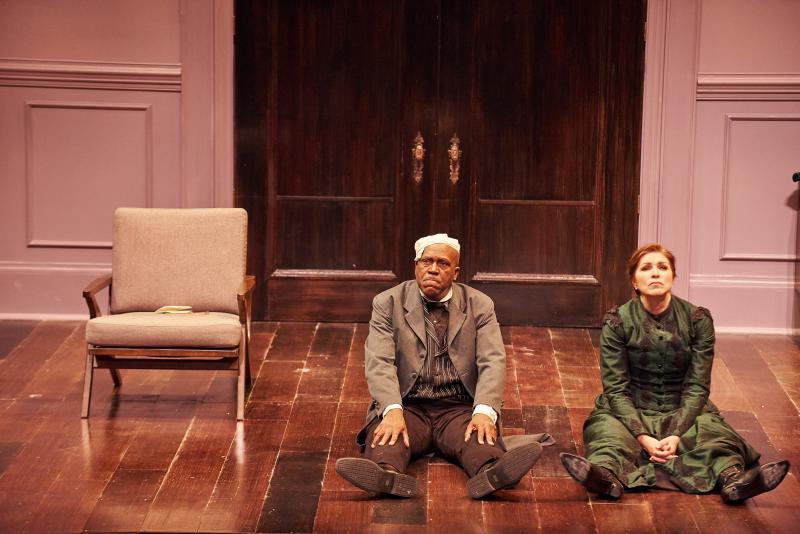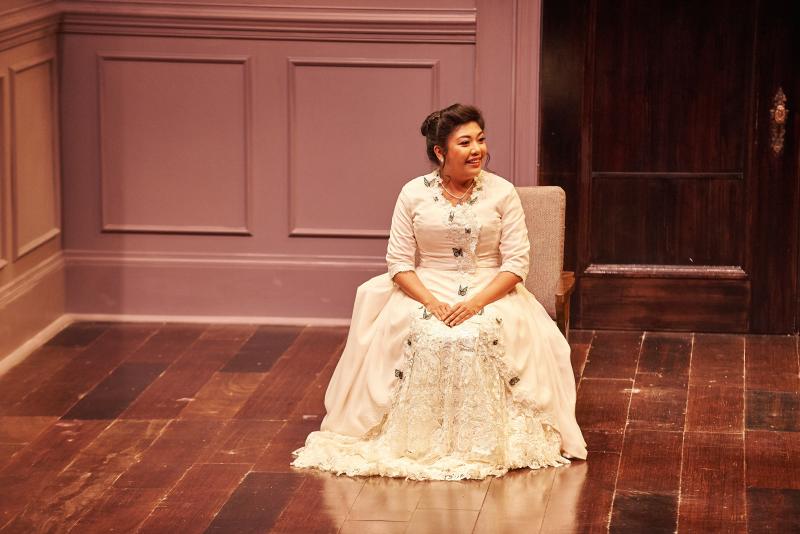Review: Aurora Theatre Kicks Off 2019 with a Complex A DOLL'S HOUSE, PART 2

The house lights fade. A short, electric line of music plays as blue lights flash. The word "Nora" appears above the center stage door in the dark. The lights come up. And we wait. The tension in the room is palpable. You can almost count the beats as the audience waits expectantly, leans in, and wonders if someone is late for their entrance. And just as each patron is about to whisper to their companion, a knock comes from the other side of the door.
Everyone who knows the ending of A DOLL'S HOUSE knows it must be her. Releasing the tension and confirming suspicions, the housekeeper Anne Marie opens the door to reveal the regal shape of Nora. She's back, and she looks fabulous. Supposing for a moment we all watched Ibsen's landmark drama yesterday, last we saw of Nora was her back as she exited this same door to pursue a life away from her husband and children.
In a co-production between the Aurora Theatre and Actor's Express, Lucas Hnath's sequel, A DOLL'S HOUSE, PART 2, sees a triumphant Nora fifteen years later, completely self-assured and firm in her identity and desires. Now a successful author, she has never looked so free-spirited. Presumably, the last fifteen years has yielded exactly what she needed. As she describes to Anne Marie, she has found great prosperity in writing about her own experiences. She has not, as many think, found difficulty in being "out in the world." This Nora is successful. She doesn't apologize. She doesn't try to please others. She is bringing her true self to every aspect of her life, and this total authenticity has made her finally happy.
What was a shocking ending to an 1879 play has now become a celebrated part of the theatre canon. So for a sequel written in 2017 with the hindsight of over 100 years, it is easy to expect this piece to be a black-and-white, preachy epilogue. I imagined Nora would have her chance to tell her family how perfect her life now is, and her children would be perfectly well-adjusted adults who greet their mother warmly, happy for her success. And then of course Torvald would be shown as the literal worst, having experienced a well-deserved downward spiral. By the end, we'd all hold hands and celebrate the power of authenticity. Thankfully, Hnath does not take the cliché route.
The author unveils layer after complicated layer of the aftermath of Nora's exit. Each character has their say convincingly enough to leave the audience completely torn, without a clear side to choose.
We support Nora's talk of independence and boundaries with other people, that no person should be forced to live in an environment that makes them miserable. Then Torvald's case about the cowardice of running away when life gets hard rather than putting work into an imperfect relationship is equally compelling. And what about Anne Marie? Stuck in the middle between Nora whom she raised like her own daughter and the whole Helmer family who are just as close to her heart, Anne Marie certainly didn't ask to be forced to choose favorites.
Then of course the elephant in the room, Emmy has no memories of her estranged mother, in whose absence Emmy has decided she wants to be nothing like the woman. In a poignant moment, Emmy tells Nora she wants to be married- not because she knows what a healthy marriage looks like, but because she knows what the absence of one looks like, and she wants the exact opposite of that. She tells Nora that all her championing of individualism and endless relationships with different men sounds lonely, not liberating at all.
Designed by Suzi Bass Award-winning Isabel and Moriah Curley-Clay, the set proves another triumph from the twins. The Helmer living room comprises the entire thing, which seems scaled to 10-foot-tall people, creating a tone that suggests something is very wrong with this household even before the drama begins. In an unusually detailed touch, the home includes a ceiling. Hanging high above the mini-people, it provides the oppressive closure to fit this eerie dollhouse.
Despite her sore throat (or otherwise illness-tainted voice), Tess Malis Kincaid proves unstoppable as Nora. She brings spontaneity to the heroine's bombastic monologues with a conversational tone. Kincaid's Nora has fully embraced her freedom in everything from her unapologetic delivery to her sometimes childlike movement vocabulary.
Shelli Delgado's Emmy shines in this production, sharply contrasting Nora with serene composure as she conveys her own powerful truths without the melodrama employed by her mother. Delgado's poise left this critic in awe that she could sit so still and smile so sweetly and yet hold the most power in the room. Also worth mentioning are strong performances from both Rob Cleveland as Torvald and Deadra Moore as Anne Marie.
Billed as "for a contemporary audience," Hnath uses modern, PG13+ language, with costumes from the 19th century, and a 20th century (ish?) set. The juxtaposition of characters in turn-of-the-century attire dropping F-bombs produces cheap laughs, as does Torvald's overdone breaking point best described as a childish tantrum. If anything, the "contemporary" elements detract from the experience. Under the direction of Freddie Ashley, A DOLL'S HOUSE, PART 2 struggles to find its tone, riding a genre-confused line between drama and comedy without landing on either. In the midst of this, Hnath presents the messiness of living life with other flawed humans and in turn produces rich dichotomies that make A DOLL'S HOUSE, PART 2 a meaningful, thought-provoking piece.
A DOLL'S HOUSE, PART 2 is playing at Aurora Theatre now through February 10, with a discount matinee on Tuesday, January 22. Tickets are currently on sale; single ticket prices start at $20 and may be purchased online at bit.ly/ADollsHousePart2 or by calling the Box Office at 678-226-6222. For more information on this production or other programming, please visit auroratheatre.com.
Add Your Comment
Videos

